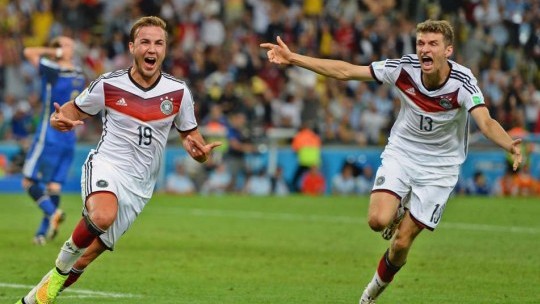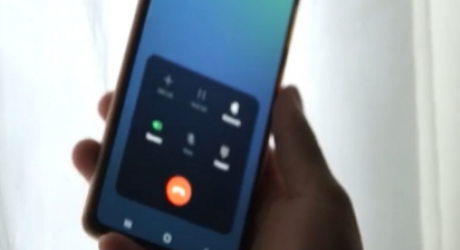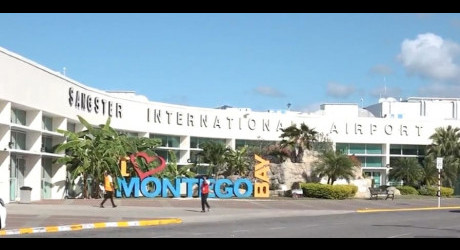By Patrick R. Anderson
The crowd packed beyond the capacity 73,531.
It numbered 74,738 inside the iconic Maracana Stadium in Rio de Janierio in South Eastern Brazil on Sunday afternoon.
'Twas "El Clasico."
Two giants of world football battling to the figurative death for the title over the next four years of World Cup Champions, and prize money of US$36.5 million. Germany, 3-time champions entering the final, and Argentina, 2-time champions. It promised much. And delivered.
Two coaching staffs with brilliant tactical plans executed to the letter by the players. Joachim Low, the Head Coach of Germany, and Alejandro Sabella, the coach of Argentina.
The match started with news of players who were missing which must of cramped the coachs' plans. Angel di Maria could not make it back from injury for Argentina, while Sami Khedira hurt himself warming up, which left Christoph Kramer in the starting role for Germany.
It was a terrific midfield battle by the teams in the early going. No traffic allowed down the middle of the park either way, as the plays were forced wide on the flanks. The first open chance and perhaps the best chance of the game fell to Gonzalo Higuain in the 20th minute. He pounced on a header from Toni Kroos who was heading towards his keeper Manuel Neuer, and Higuain shot wide left from the top of the box when all alone.
Minutes later, Higuain celebrated what he thought was a goal for Argentina, but the assistant referee correctly ruled it occured from an offside position.
Argentina was surging now in attacks, with Germany surprisingly allowing Messi much room to roam on the park. Germany soaked up the pressure, including Jerome Boateng clearing from almost off the line, but in counterattacking, Germany also missed a chance in the 36th minute. Three minutes later, Higuain again was the culprit, missing another chance to put Argentina in the lead. From this position, it became clear that one goal might be enough to win the world cup. And it was.
In the 43rd minute, Toni Kroos missed from a sublime "tiki taka" German build up, and then a minute later, Miroslav Klose missed out on his 17th World Cup goal. He is the current record holder for world cup goals, at 16.
In the second half, Ezequiel Lavezzi was substituted by Sabella for Sergio Aguero to no avail. Importantly, in the 31st minute, Christoph Kramer was injured and replaced by Andre Schuerrle. Make a note of that change.
But two minutes into the second half, Messi was released on the left channel and from the top of the box at an angle, Messi dragged his left footed grounder just wide of the left upright. On any given day, Messi scores. It appeared it was not Argentina's day.
In a physical contest - four cautions were issued by Italian referee Nicola Rizzoli who had an outstanding game - Messi went missing in action after that 47th minute opportunity, only turning up in spots. And when Higuain was substituted in the 77th minute for Rodrigo Palacio, and Toni Kroos missed a golden chance from 19 yards from the top of the box in the "D" for Germany, the battle of attrition escalated.
Germany missed from an 80th minute melee, then Argentina switched Enzo Perez for Gago in the 85th minute, and Germany switched Klose for Mario Goetze in the 88th minute. Again, please note this change along with Schuerrle who came on in the 31st minute for Germany.
At Full time, Germany 0, Argentina 0.
And as the teams went in search of the winner in extra time, Germany looked the fresher team. But it was Argentina who again missed big time. Palacio controlled the ball passed from the left side by Messi. But Palacio who was alone close to the penalty spot, put too much weight on the control, and couldn't offer a finish.
At this point, HITZ92FM's analyst Anthony "Follies" Williams offered this gem: "The teams resembled the London Philarmonic Orchestra. They played to the tune. Not once in the game they lost their shape."
Nil-all after 105 minutes of world cup final football. Then the fatal attack by Germany occured in the 113th minute when they picked up the ball at the half line on the left side of the park.
Schuerrle and Goetze - the two substitutes - set off down the left flank, then Goetze pulled inside and rotated to the right towards the penalty box. No Argentina player reacted. Schuerrle's cross was pinpointed to Goetze, who controlled superbly on his chest from six yards out, and finished with a crisp left footed volley four yards away to the left of Sergio Romero, and Germany had taken a 1-0 lead. It proved to be the moment for Germany.
Germany missed a further chance in the 119th minute as Argentina faded into the Rio night, behind the backdrop of Christ The Redeemer Statue overlooking the Maracana.
The final whistle sounded, and Germany was the 4-time World Cup Champions and deservedly so, as the best team won the tournament. It was perhaps one of the most wide open free scoring world cup finals ever. Germany became the first European team to win a world cup on the South American continent, as the UEFA and CONMEBOL Confederations remain the only ones to have won the world cup, with Europe now leading 11-9 in the win column.
Germany joins Italy on 4-world titles, behind Brazil 5, Uruguay 2, Argentina 2, Spain, France and England, one each.
Sixty four matches, 171 goals at an average of 2.67 goals per match was stunning, as Colombia's James Rodriguez won the Golden Boot award with 6 goals; Argentina's Lionel Messi, the Golden Ball award for being the tournament's MVP; and Germany's Manuel Neuer the Golden Glove award for being the top goalkeeper.
This 20th FIFA World Cup final, was simply "El Clasico."









 All feeds
All feeds







